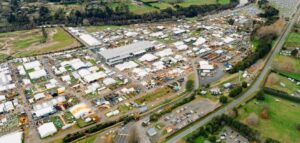Maralinga: stories that need to be heard
Aborigines have suffered the effects of nuclear testing for decades, now John Mandelberg looks to share their stories.

Photo credit: Ben Flood
When nuclear bombs are mentioned, few think about Australia, but those who know more than enough are the Aboriginal people of Maralinga.
Wintec tutor and filmmaker John Mandelberg is filming a documentary about the damage suffered by local indigenous communities following the nuclear testing conducted by the British in the 1950s in Australia.
“When I talk about nuclear testing on aboriginal lands, people just look blank,” Mandelberg says.
Based on, and named after, the book Totem and Ore by Australian and Serbian writer and anthropologist B. Wongar, the film documents the effects of the Maralinga testing on Aboriginal people and compares these with people from similar catastrophes.
“The film will start in Hiroshima where the first nuclear bomb was dropped, then head to Maralinga, finishing in Fukushima, where the most recent nuclear meltdown took place,” Mandelberg says.
Award-winning Aboriginal actress Ursula Yovich, known for her role in the film Australia, and Waikato actor David Artis will feature in the film, reading testimonials of those who were involved with the nuclear testing.
“Ursula will read from the point of view of the aboriginal communities, and David as a lawyer in defence of the testing,” Mandelberg says. “They both bring great qualities that fit their particular roles.”
Yovich, whose acting career has focused on the oppression of the aboriginal people, says Maralinga has become a big interest.
“The nuclear testing at Maralinga has been something that was creeping into my life before John approached me,” Yovich says.
“I think the majority of people don’t know the stories of those who suffered from the testing but would be interested to hear about them.”
One of those who was affected is Aboriginal man Yami Lester, who lost his eyesight at the age of 10 after watching the bomb ‘Emu 1’ explode.
Shoot photographer for the documentary, Janice Abo Ganis, says the film will remind people of the threat nuclear weapons pose.
“Nuclear testing can get lost in the day-to-day rubbish that we read and we need to be reminded of the sheer horror that has been created through the use of that technology,” Abo Ganis says.
The film is set to be finished by August 2018 and is expected to premiere at the Hiroshima Peace Film Festival that year.




